NUR3030: Exploring Aboriginal and Torres Strait Islander Well-being
VerifiedAdded on 2023/06/16
|12
|3158
|329
Report
AI Summary
This report examines the concept of social and emotional well-being among Aboriginal and Torres Strait Islander people, highlighting their preference for this term over "mental health" due to its holistic connotations. It explores the differences between the Aboriginal concept of social and emotional well-being and the non-indigenous perspective on mental health, emphasizing the importance of cultural connection and addressing socioeconomic factors. The report also traces the evolution of Aboriginal Medical Services (AMS) and their alignment with WHO's primary health care principles, focusing on universal access, community participation, and health equity. Furthermore, it discusses the application of social and emotional well-being principles in an Aboriginal Community Controlled Health Service (ACCHS), using Danila Dilba Health Service as an example, and emphasizes the importance of culturally appropriate care and advocacy to improve the well-being of indigenous communities.
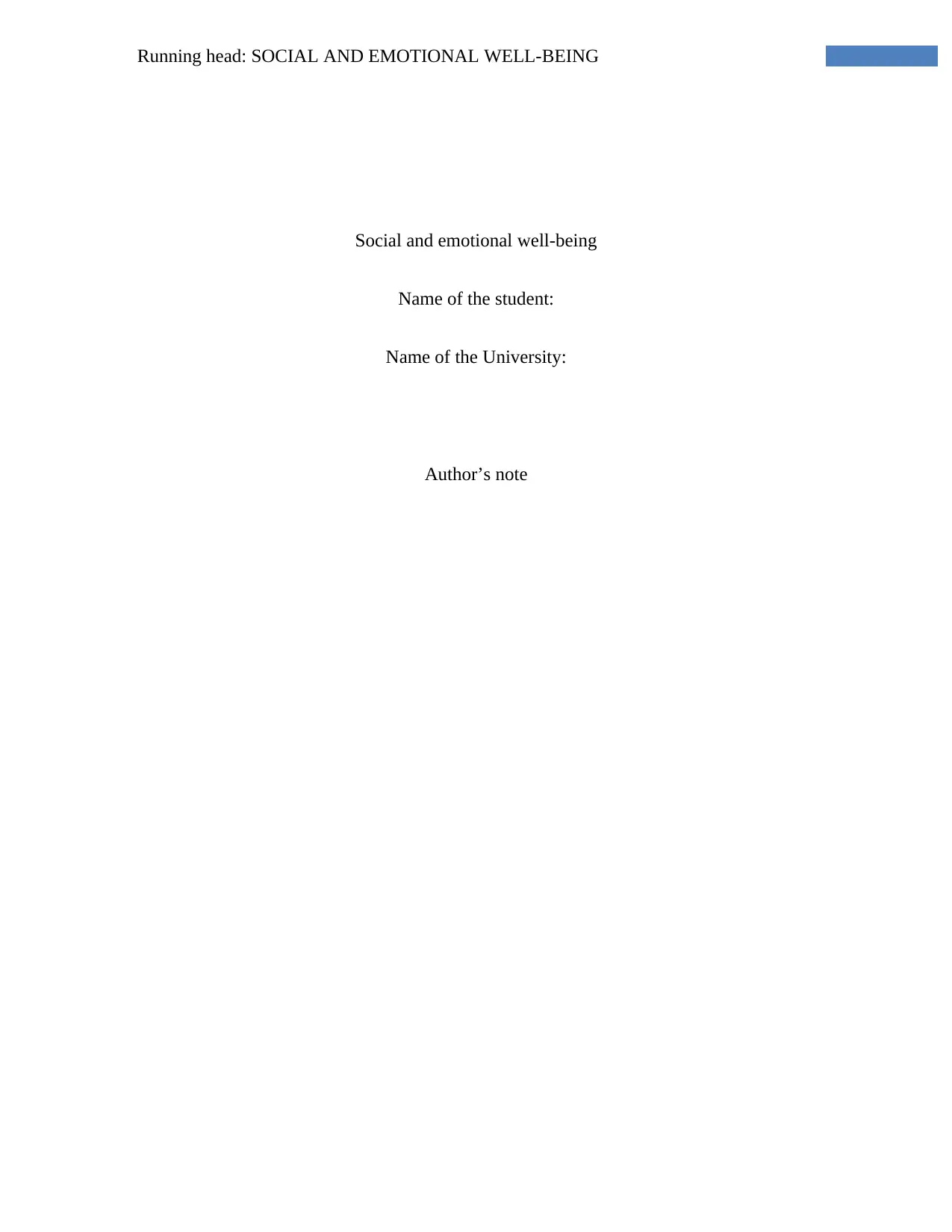
Running head: SOCIAL AND EMOTIONAL WELL-BEING
Social and emotional well-being
Name of the student:
Name of the University:
Author’s note
Social and emotional well-being
Name of the student:
Name of the University:
Author’s note
Paraphrase This Document
Need a fresh take? Get an instant paraphrase of this document with our AI Paraphraser
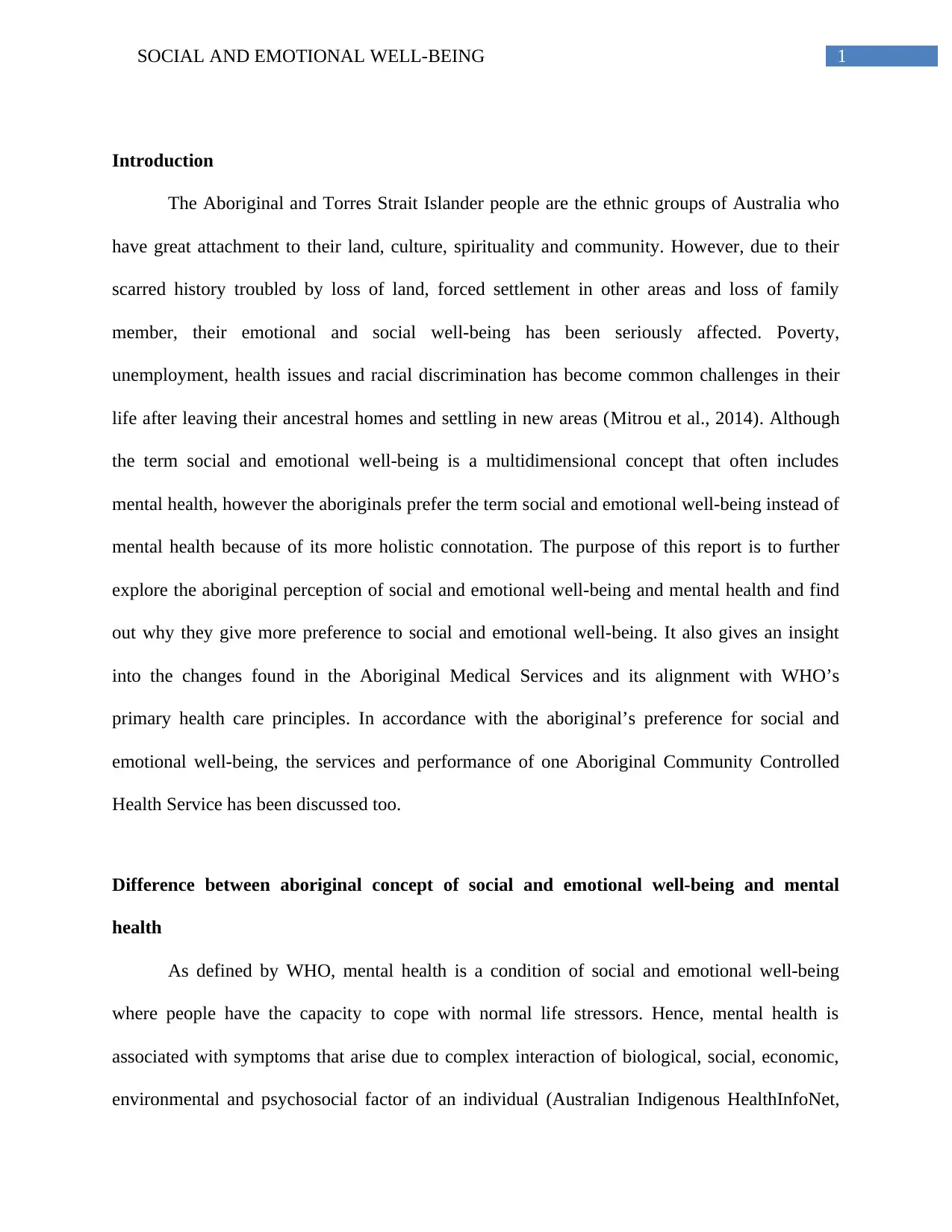
1SOCIAL AND EMOTIONAL WELL-BEING
Introduction
The Aboriginal and Torres Strait Islander people are the ethnic groups of Australia who
have great attachment to their land, culture, spirituality and community. However, due to their
scarred history troubled by loss of land, forced settlement in other areas and loss of family
member, their emotional and social well-being has been seriously affected. Poverty,
unemployment, health issues and racial discrimination has become common challenges in their
life after leaving their ancestral homes and settling in new areas (Mitrou et al., 2014). Although
the term social and emotional well-being is a multidimensional concept that often includes
mental health, however the aboriginals prefer the term social and emotional well-being instead of
mental health because of its more holistic connotation. The purpose of this report is to further
explore the aboriginal perception of social and emotional well-being and mental health and find
out why they give more preference to social and emotional well-being. It also gives an insight
into the changes found in the Aboriginal Medical Services and its alignment with WHO’s
primary health care principles. In accordance with the aboriginal’s preference for social and
emotional well-being, the services and performance of one Aboriginal Community Controlled
Health Service has been discussed too.
Difference between aboriginal concept of social and emotional well-being and mental
health
As defined by WHO, mental health is a condition of social and emotional well-being
where people have the capacity to cope with normal life stressors. Hence, mental health is
associated with symptoms that arise due to complex interaction of biological, social, economic,
environmental and psychosocial factor of an individual (Australian Indigenous HealthInfoNet,
Introduction
The Aboriginal and Torres Strait Islander people are the ethnic groups of Australia who
have great attachment to their land, culture, spirituality and community. However, due to their
scarred history troubled by loss of land, forced settlement in other areas and loss of family
member, their emotional and social well-being has been seriously affected. Poverty,
unemployment, health issues and racial discrimination has become common challenges in their
life after leaving their ancestral homes and settling in new areas (Mitrou et al., 2014). Although
the term social and emotional well-being is a multidimensional concept that often includes
mental health, however the aboriginals prefer the term social and emotional well-being instead of
mental health because of its more holistic connotation. The purpose of this report is to further
explore the aboriginal perception of social and emotional well-being and mental health and find
out why they give more preference to social and emotional well-being. It also gives an insight
into the changes found in the Aboriginal Medical Services and its alignment with WHO’s
primary health care principles. In accordance with the aboriginal’s preference for social and
emotional well-being, the services and performance of one Aboriginal Community Controlled
Health Service has been discussed too.
Difference between aboriginal concept of social and emotional well-being and mental
health
As defined by WHO, mental health is a condition of social and emotional well-being
where people have the capacity to cope with normal life stressors. Hence, mental health is
associated with symptoms that arise due to complex interaction of biological, social, economic,
environmental and psychosocial factor of an individual (Australian Indigenous HealthInfoNet,
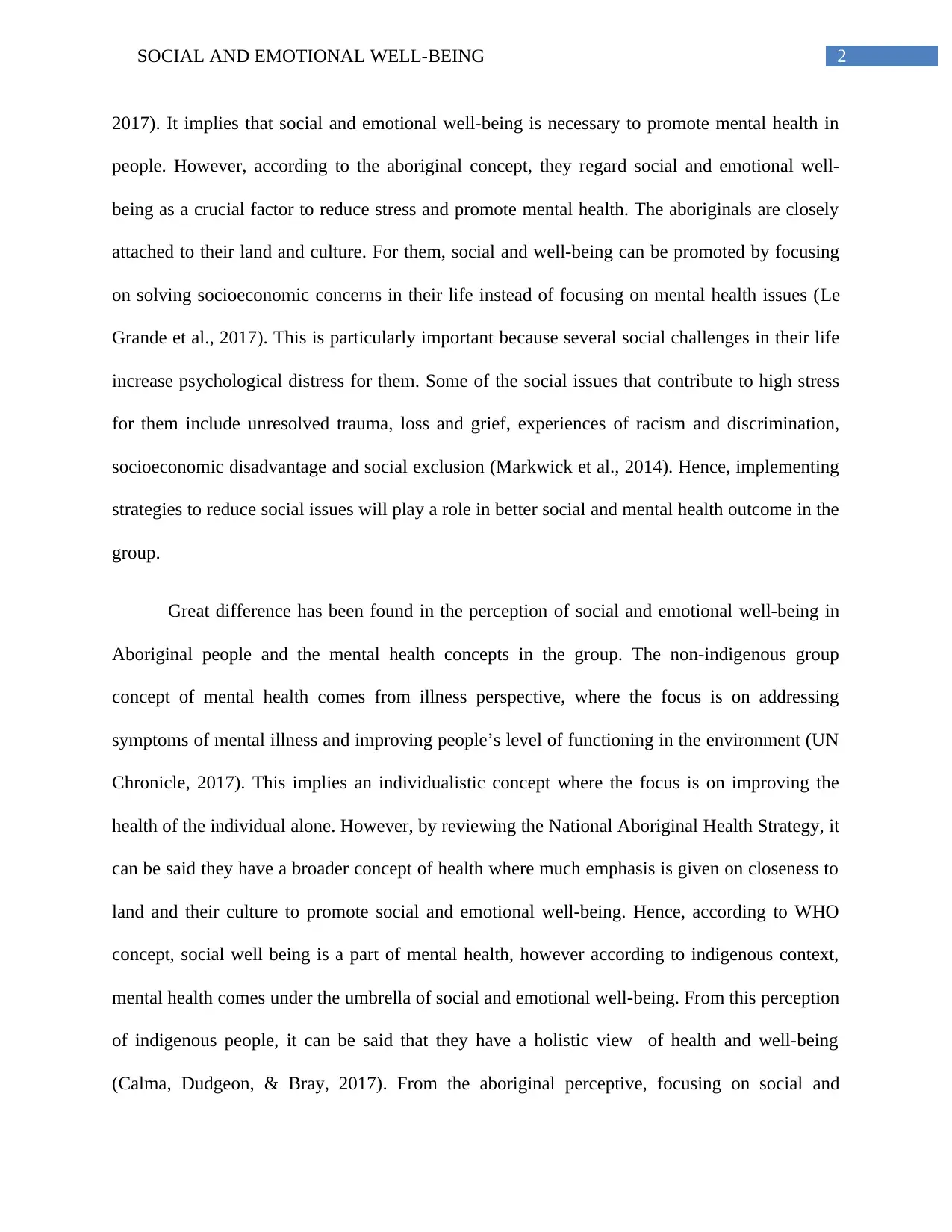
2SOCIAL AND EMOTIONAL WELL-BEING
2017). It implies that social and emotional well-being is necessary to promote mental health in
people. However, according to the aboriginal concept, they regard social and emotional well-
being as a crucial factor to reduce stress and promote mental health. The aboriginals are closely
attached to their land and culture. For them, social and well-being can be promoted by focusing
on solving socioeconomic concerns in their life instead of focusing on mental health issues (Le
Grande et al., 2017). This is particularly important because several social challenges in their life
increase psychological distress for them. Some of the social issues that contribute to high stress
for them include unresolved trauma, loss and grief, experiences of racism and discrimination,
socioeconomic disadvantage and social exclusion (Markwick et al., 2014). Hence, implementing
strategies to reduce social issues will play a role in better social and mental health outcome in the
group.
Great difference has been found in the perception of social and emotional well-being in
Aboriginal people and the mental health concepts in the group. The non-indigenous group
concept of mental health comes from illness perspective, where the focus is on addressing
symptoms of mental illness and improving people’s level of functioning in the environment (UN
Chronicle, 2017). This implies an individualistic concept where the focus is on improving the
health of the individual alone. However, by reviewing the National Aboriginal Health Strategy, it
can be said they have a broader concept of health where much emphasis is given on closeness to
land and their culture to promote social and emotional well-being. Hence, according to WHO
concept, social well being is a part of mental health, however according to indigenous context,
mental health comes under the umbrella of social and emotional well-being. From this perception
of indigenous people, it can be said that they have a holistic view of health and well-being
(Calma, Dudgeon, & Bray, 2017). From the aboriginal perceptive, focusing on social and
2017). It implies that social and emotional well-being is necessary to promote mental health in
people. However, according to the aboriginal concept, they regard social and emotional well-
being as a crucial factor to reduce stress and promote mental health. The aboriginals are closely
attached to their land and culture. For them, social and well-being can be promoted by focusing
on solving socioeconomic concerns in their life instead of focusing on mental health issues (Le
Grande et al., 2017). This is particularly important because several social challenges in their life
increase psychological distress for them. Some of the social issues that contribute to high stress
for them include unresolved trauma, loss and grief, experiences of racism and discrimination,
socioeconomic disadvantage and social exclusion (Markwick et al., 2014). Hence, implementing
strategies to reduce social issues will play a role in better social and mental health outcome in the
group.
Great difference has been found in the perception of social and emotional well-being in
Aboriginal people and the mental health concepts in the group. The non-indigenous group
concept of mental health comes from illness perspective, where the focus is on addressing
symptoms of mental illness and improving people’s level of functioning in the environment (UN
Chronicle, 2017). This implies an individualistic concept where the focus is on improving the
health of the individual alone. However, by reviewing the National Aboriginal Health Strategy, it
can be said they have a broader concept of health where much emphasis is given on closeness to
land and their culture to promote social and emotional well-being. Hence, according to WHO
concept, social well being is a part of mental health, however according to indigenous context,
mental health comes under the umbrella of social and emotional well-being. From this perception
of indigenous people, it can be said that they have a holistic view of health and well-being
(Calma, Dudgeon, & Bray, 2017). From the aboriginal perceptive, focusing on social and
⊘ This is a preview!⊘
Do you want full access?
Subscribe today to unlock all pages.

Trusted by 1+ million students worldwide
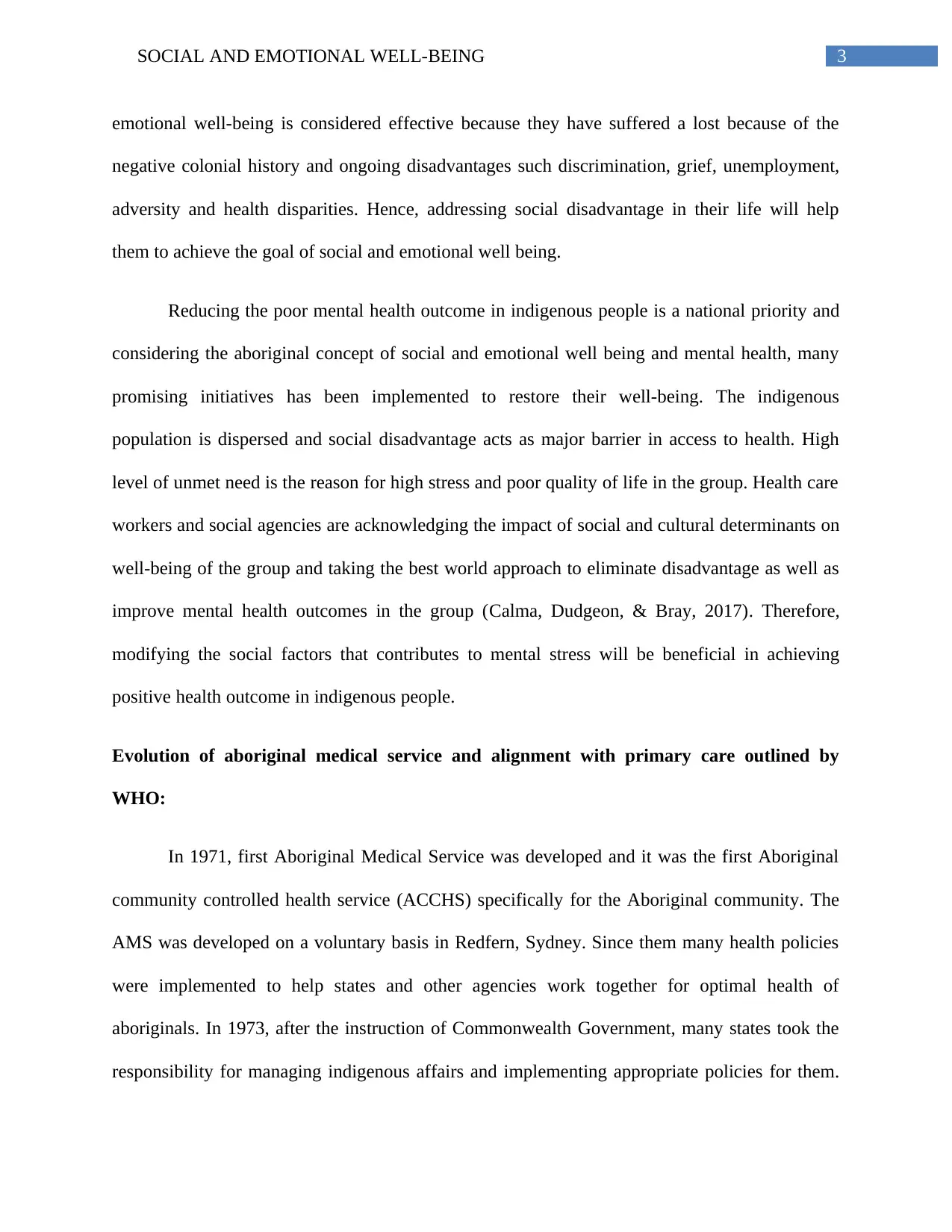
3SOCIAL AND EMOTIONAL WELL-BEING
emotional well-being is considered effective because they have suffered a lost because of the
negative colonial history and ongoing disadvantages such discrimination, grief, unemployment,
adversity and health disparities. Hence, addressing social disadvantage in their life will help
them to achieve the goal of social and emotional well being.
Reducing the poor mental health outcome in indigenous people is a national priority and
considering the aboriginal concept of social and emotional well being and mental health, many
promising initiatives has been implemented to restore their well-being. The indigenous
population is dispersed and social disadvantage acts as major barrier in access to health. High
level of unmet need is the reason for high stress and poor quality of life in the group. Health care
workers and social agencies are acknowledging the impact of social and cultural determinants on
well-being of the group and taking the best world approach to eliminate disadvantage as well as
improve mental health outcomes in the group (Calma, Dudgeon, & Bray, 2017). Therefore,
modifying the social factors that contributes to mental stress will be beneficial in achieving
positive health outcome in indigenous people.
Evolution of aboriginal medical service and alignment with primary care outlined by
WHO:
In 1971, first Aboriginal Medical Service was developed and it was the first Aboriginal
community controlled health service (ACCHS) specifically for the Aboriginal community. The
AMS was developed on a voluntary basis in Redfern, Sydney. Since them many health policies
were implemented to help states and other agencies work together for optimal health of
aboriginals. In 1973, after the instruction of Commonwealth Government, many states took the
responsibility for managing indigenous affairs and implementing appropriate policies for them.
emotional well-being is considered effective because they have suffered a lost because of the
negative colonial history and ongoing disadvantages such discrimination, grief, unemployment,
adversity and health disparities. Hence, addressing social disadvantage in their life will help
them to achieve the goal of social and emotional well being.
Reducing the poor mental health outcome in indigenous people is a national priority and
considering the aboriginal concept of social and emotional well being and mental health, many
promising initiatives has been implemented to restore their well-being. The indigenous
population is dispersed and social disadvantage acts as major barrier in access to health. High
level of unmet need is the reason for high stress and poor quality of life in the group. Health care
workers and social agencies are acknowledging the impact of social and cultural determinants on
well-being of the group and taking the best world approach to eliminate disadvantage as well as
improve mental health outcomes in the group (Calma, Dudgeon, & Bray, 2017). Therefore,
modifying the social factors that contributes to mental stress will be beneficial in achieving
positive health outcome in indigenous people.
Evolution of aboriginal medical service and alignment with primary care outlined by
WHO:
In 1971, first Aboriginal Medical Service was developed and it was the first Aboriginal
community controlled health service (ACCHS) specifically for the Aboriginal community. The
AMS was developed on a voluntary basis in Redfern, Sydney. Since them many health policies
were implemented to help states and other agencies work together for optimal health of
aboriginals. In 1973, after the instruction of Commonwealth Government, many states took the
responsibility for managing indigenous affairs and implementing appropriate policies for them.
Paraphrase This Document
Need a fresh take? Get an instant paraphrase of this document with our AI Paraphraser
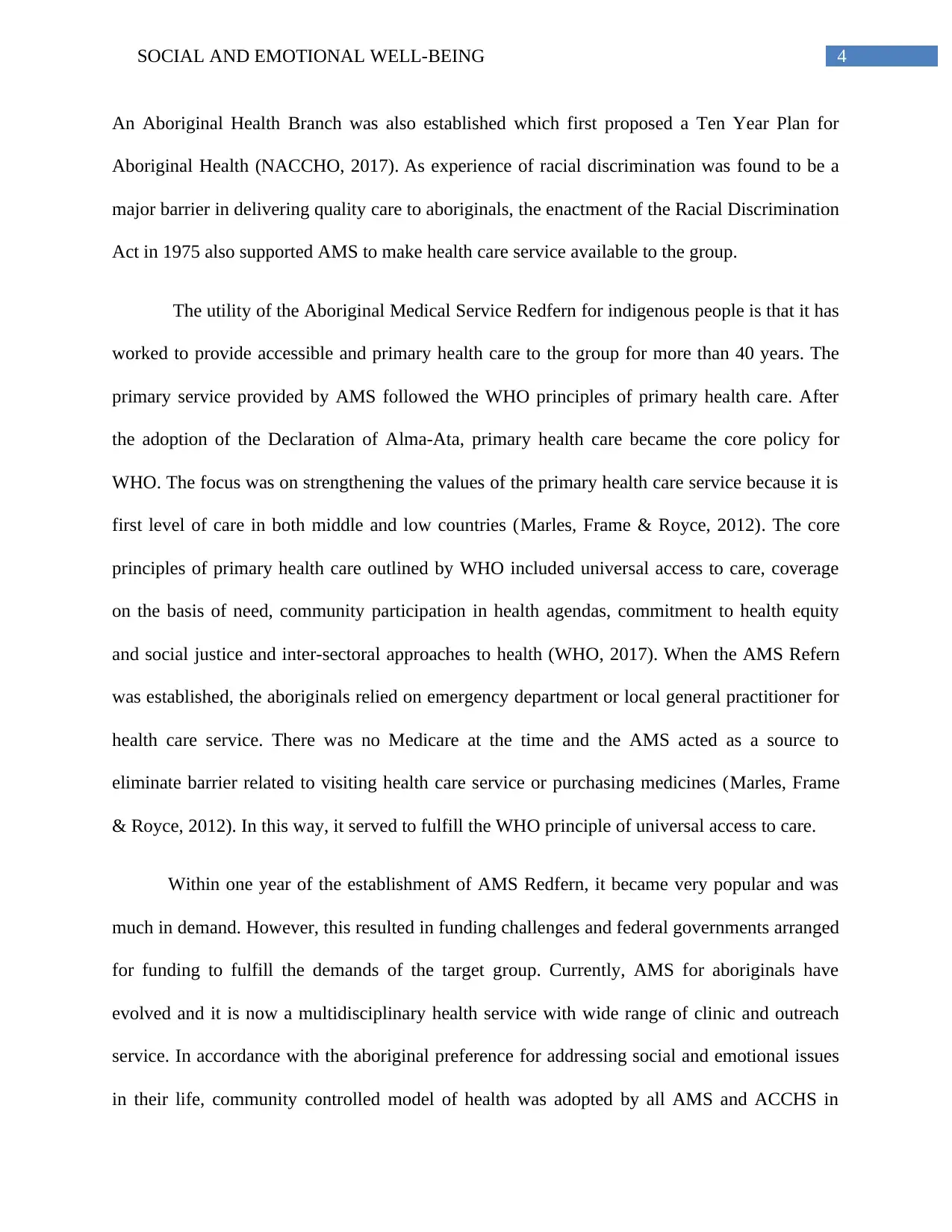
4SOCIAL AND EMOTIONAL WELL-BEING
An Aboriginal Health Branch was also established which first proposed a Ten Year Plan for
Aboriginal Health (NACCHO, 2017). As experience of racial discrimination was found to be a
major barrier in delivering quality care to aboriginals, the enactment of the Racial Discrimination
Act in 1975 also supported AMS to make health care service available to the group.
The utility of the Aboriginal Medical Service Redfern for indigenous people is that it has
worked to provide accessible and primary health care to the group for more than 40 years. The
primary service provided by AMS followed the WHO principles of primary health care. After
the adoption of the Declaration of Alma-Ata, primary health care became the core policy for
WHO. The focus was on strengthening the values of the primary health care service because it is
first level of care in both middle and low countries (Marles, Frame & Royce, 2012). The core
principles of primary health care outlined by WHO included universal access to care, coverage
on the basis of need, community participation in health agendas, commitment to health equity
and social justice and inter-sectoral approaches to health (WHO, 2017). When the AMS Refern
was established, the aboriginals relied on emergency department or local general practitioner for
health care service. There was no Medicare at the time and the AMS acted as a source to
eliminate barrier related to visiting health care service or purchasing medicines (Marles, Frame
& Royce, 2012). In this way, it served to fulfill the WHO principle of universal access to care.
Within one year of the establishment of AMS Redfern, it became very popular and was
much in demand. However, this resulted in funding challenges and federal governments arranged
for funding to fulfill the demands of the target group. Currently, AMS for aboriginals have
evolved and it is now a multidisciplinary health service with wide range of clinic and outreach
service. In accordance with the aboriginal preference for addressing social and emotional issues
in their life, community controlled model of health was adopted by all AMS and ACCHS in
An Aboriginal Health Branch was also established which first proposed a Ten Year Plan for
Aboriginal Health (NACCHO, 2017). As experience of racial discrimination was found to be a
major barrier in delivering quality care to aboriginals, the enactment of the Racial Discrimination
Act in 1975 also supported AMS to make health care service available to the group.
The utility of the Aboriginal Medical Service Redfern for indigenous people is that it has
worked to provide accessible and primary health care to the group for more than 40 years. The
primary service provided by AMS followed the WHO principles of primary health care. After
the adoption of the Declaration of Alma-Ata, primary health care became the core policy for
WHO. The focus was on strengthening the values of the primary health care service because it is
first level of care in both middle and low countries (Marles, Frame & Royce, 2012). The core
principles of primary health care outlined by WHO included universal access to care, coverage
on the basis of need, community participation in health agendas, commitment to health equity
and social justice and inter-sectoral approaches to health (WHO, 2017). When the AMS Refern
was established, the aboriginals relied on emergency department or local general practitioner for
health care service. There was no Medicare at the time and the AMS acted as a source to
eliminate barrier related to visiting health care service or purchasing medicines (Marles, Frame
& Royce, 2012). In this way, it served to fulfill the WHO principle of universal access to care.
Within one year of the establishment of AMS Redfern, it became very popular and was
much in demand. However, this resulted in funding challenges and federal governments arranged
for funding to fulfill the demands of the target group. Currently, AMS for aboriginals have
evolved and it is now a multidisciplinary health service with wide range of clinic and outreach
service. In accordance with the aboriginal preference for addressing social and emotional issues
in their life, community controlled model of health was adopted by all AMS and ACCHS in
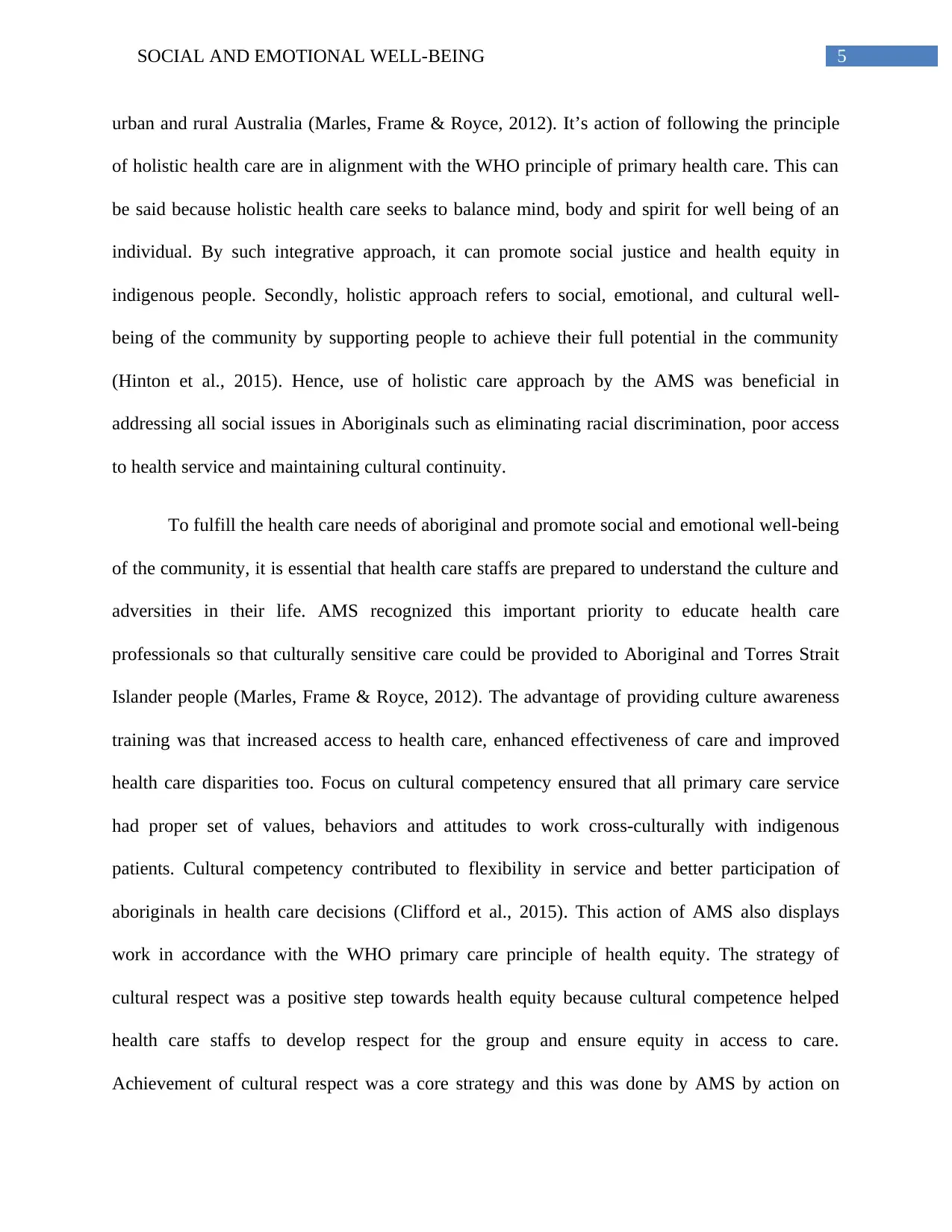
5SOCIAL AND EMOTIONAL WELL-BEING
urban and rural Australia (Marles, Frame & Royce, 2012). It’s action of following the principle
of holistic health care are in alignment with the WHO principle of primary health care. This can
be said because holistic health care seeks to balance mind, body and spirit for well being of an
individual. By such integrative approach, it can promote social justice and health equity in
indigenous people. Secondly, holistic approach refers to social, emotional, and cultural well-
being of the community by supporting people to achieve their full potential in the community
(Hinton et al., 2015). Hence, use of holistic care approach by the AMS was beneficial in
addressing all social issues in Aboriginals such as eliminating racial discrimination, poor access
to health service and maintaining cultural continuity.
To fulfill the health care needs of aboriginal and promote social and emotional well-being
of the community, it is essential that health care staffs are prepared to understand the culture and
adversities in their life. AMS recognized this important priority to educate health care
professionals so that culturally sensitive care could be provided to Aboriginal and Torres Strait
Islander people (Marles, Frame & Royce, 2012). The advantage of providing culture awareness
training was that increased access to health care, enhanced effectiveness of care and improved
health care disparities too. Focus on cultural competency ensured that all primary care service
had proper set of values, behaviors and attitudes to work cross-culturally with indigenous
patients. Cultural competency contributed to flexibility in service and better participation of
aboriginals in health care decisions (Clifford et al., 2015). This action of AMS also displays
work in accordance with the WHO primary care principle of health equity. The strategy of
cultural respect was a positive step towards health equity because cultural competence helped
health care staffs to develop respect for the group and ensure equity in access to care.
Achievement of cultural respect was a core strategy and this was done by AMS by action on
urban and rural Australia (Marles, Frame & Royce, 2012). It’s action of following the principle
of holistic health care are in alignment with the WHO principle of primary health care. This can
be said because holistic health care seeks to balance mind, body and spirit for well being of an
individual. By such integrative approach, it can promote social justice and health equity in
indigenous people. Secondly, holistic approach refers to social, emotional, and cultural well-
being of the community by supporting people to achieve their full potential in the community
(Hinton et al., 2015). Hence, use of holistic care approach by the AMS was beneficial in
addressing all social issues in Aboriginals such as eliminating racial discrimination, poor access
to health service and maintaining cultural continuity.
To fulfill the health care needs of aboriginal and promote social and emotional well-being
of the community, it is essential that health care staffs are prepared to understand the culture and
adversities in their life. AMS recognized this important priority to educate health care
professionals so that culturally sensitive care could be provided to Aboriginal and Torres Strait
Islander people (Marles, Frame & Royce, 2012). The advantage of providing culture awareness
training was that increased access to health care, enhanced effectiveness of care and improved
health care disparities too. Focus on cultural competency ensured that all primary care service
had proper set of values, behaviors and attitudes to work cross-culturally with indigenous
patients. Cultural competency contributed to flexibility in service and better participation of
aboriginals in health care decisions (Clifford et al., 2015). This action of AMS also displays
work in accordance with the WHO primary care principle of health equity. The strategy of
cultural respect was a positive step towards health equity because cultural competence helped
health care staffs to develop respect for the group and ensure equity in access to care.
Achievement of cultural respect was a core strategy and this was done by AMS by action on
⊘ This is a preview!⊘
Do you want full access?
Subscribe today to unlock all pages.

Trusted by 1+ million students worldwide
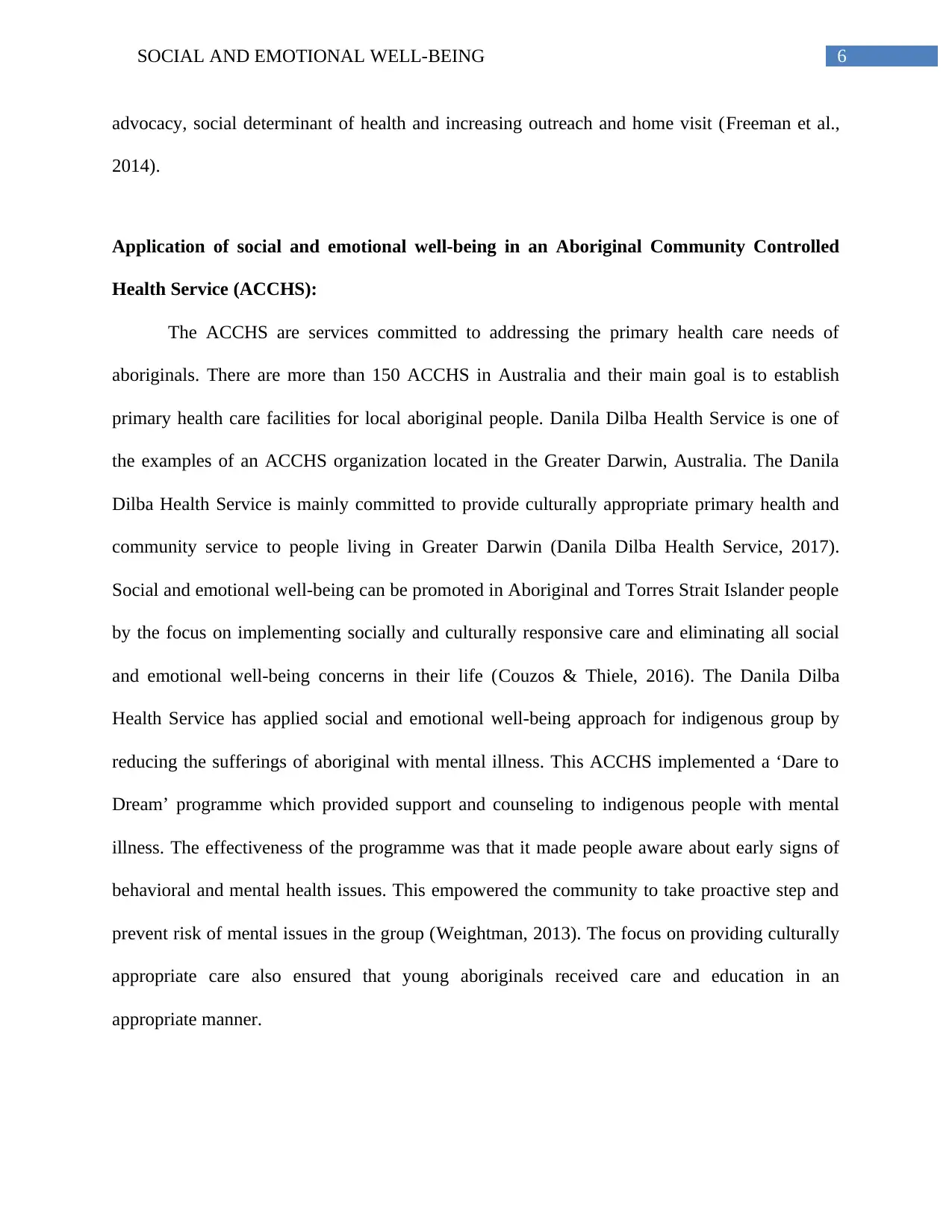
6SOCIAL AND EMOTIONAL WELL-BEING
advocacy, social determinant of health and increasing outreach and home visit (Freeman et al.,
2014).
Application of social and emotional well-being in an Aboriginal Community Controlled
Health Service (ACCHS):
The ACCHS are services committed to addressing the primary health care needs of
aboriginals. There are more than 150 ACCHS in Australia and their main goal is to establish
primary health care facilities for local aboriginal people. Danila Dilba Health Service is one of
the examples of an ACCHS organization located in the Greater Darwin, Australia. The Danila
Dilba Health Service is mainly committed to provide culturally appropriate primary health and
community service to people living in Greater Darwin (Danila Dilba Health Service, 2017).
Social and emotional well-being can be promoted in Aboriginal and Torres Strait Islander people
by the focus on implementing socially and culturally responsive care and eliminating all social
and emotional well-being concerns in their life (Couzos & Thiele, 2016). The Danila Dilba
Health Service has applied social and emotional well-being approach for indigenous group by
reducing the sufferings of aboriginal with mental illness. This ACCHS implemented a ‘Dare to
Dream’ programme which provided support and counseling to indigenous people with mental
illness. The effectiveness of the programme was that it made people aware about early signs of
behavioral and mental health issues. This empowered the community to take proactive step and
prevent risk of mental issues in the group (Weightman, 2013). The focus on providing culturally
appropriate care also ensured that young aboriginals received care and education in an
appropriate manner.
advocacy, social determinant of health and increasing outreach and home visit (Freeman et al.,
2014).
Application of social and emotional well-being in an Aboriginal Community Controlled
Health Service (ACCHS):
The ACCHS are services committed to addressing the primary health care needs of
aboriginals. There are more than 150 ACCHS in Australia and their main goal is to establish
primary health care facilities for local aboriginal people. Danila Dilba Health Service is one of
the examples of an ACCHS organization located in the Greater Darwin, Australia. The Danila
Dilba Health Service is mainly committed to provide culturally appropriate primary health and
community service to people living in Greater Darwin (Danila Dilba Health Service, 2017).
Social and emotional well-being can be promoted in Aboriginal and Torres Strait Islander people
by the focus on implementing socially and culturally responsive care and eliminating all social
and emotional well-being concerns in their life (Couzos & Thiele, 2016). The Danila Dilba
Health Service has applied social and emotional well-being approach for indigenous group by
reducing the sufferings of aboriginal with mental illness. This ACCHS implemented a ‘Dare to
Dream’ programme which provided support and counseling to indigenous people with mental
illness. The effectiveness of the programme was that it made people aware about early signs of
behavioral and mental health issues. This empowered the community to take proactive step and
prevent risk of mental issues in the group (Weightman, 2013). The focus on providing culturally
appropriate care also ensured that young aboriginals received care and education in an
appropriate manner.
Paraphrase This Document
Need a fresh take? Get an instant paraphrase of this document with our AI Paraphraser
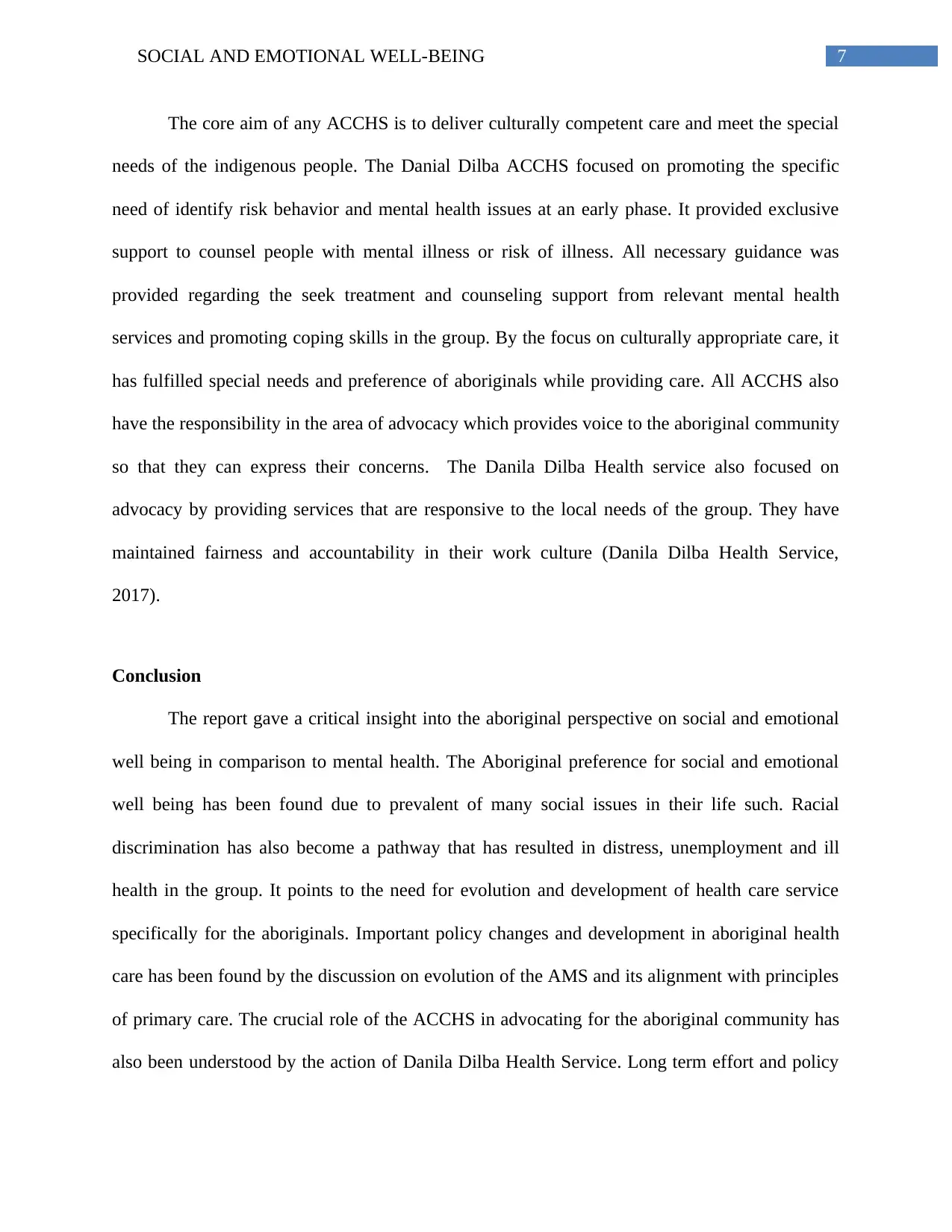
7SOCIAL AND EMOTIONAL WELL-BEING
The core aim of any ACCHS is to deliver culturally competent care and meet the special
needs of the indigenous people. The Danial Dilba ACCHS focused on promoting the specific
need of identify risk behavior and mental health issues at an early phase. It provided exclusive
support to counsel people with mental illness or risk of illness. All necessary guidance was
provided regarding the seek treatment and counseling support from relevant mental health
services and promoting coping skills in the group. By the focus on culturally appropriate care, it
has fulfilled special needs and preference of aboriginals while providing care. All ACCHS also
have the responsibility in the area of advocacy which provides voice to the aboriginal community
so that they can express their concerns. The Danila Dilba Health service also focused on
advocacy by providing services that are responsive to the local needs of the group. They have
maintained fairness and accountability in their work culture (Danila Dilba Health Service,
2017).
Conclusion
The report gave a critical insight into the aboriginal perspective on social and emotional
well being in comparison to mental health. The Aboriginal preference for social and emotional
well being has been found due to prevalent of many social issues in their life such. Racial
discrimination has also become a pathway that has resulted in distress, unemployment and ill
health in the group. It points to the need for evolution and development of health care service
specifically for the aboriginals. Important policy changes and development in aboriginal health
care has been found by the discussion on evolution of the AMS and its alignment with principles
of primary care. The crucial role of the ACCHS in advocating for the aboriginal community has
also been understood by the action of Danila Dilba Health Service. Long term effort and policy
The core aim of any ACCHS is to deliver culturally competent care and meet the special
needs of the indigenous people. The Danial Dilba ACCHS focused on promoting the specific
need of identify risk behavior and mental health issues at an early phase. It provided exclusive
support to counsel people with mental illness or risk of illness. All necessary guidance was
provided regarding the seek treatment and counseling support from relevant mental health
services and promoting coping skills in the group. By the focus on culturally appropriate care, it
has fulfilled special needs and preference of aboriginals while providing care. All ACCHS also
have the responsibility in the area of advocacy which provides voice to the aboriginal community
so that they can express their concerns. The Danila Dilba Health service also focused on
advocacy by providing services that are responsive to the local needs of the group. They have
maintained fairness and accountability in their work culture (Danila Dilba Health Service,
2017).
Conclusion
The report gave a critical insight into the aboriginal perspective on social and emotional
well being in comparison to mental health. The Aboriginal preference for social and emotional
well being has been found due to prevalent of many social issues in their life such. Racial
discrimination has also become a pathway that has resulted in distress, unemployment and ill
health in the group. It points to the need for evolution and development of health care service
specifically for the aboriginals. Important policy changes and development in aboriginal health
care has been found by the discussion on evolution of the AMS and its alignment with principles
of primary care. The crucial role of the ACCHS in advocating for the aboriginal community has
also been understood by the action of Danila Dilba Health Service. Long term effort and policy

8SOCIAL AND EMOTIONAL WELL-BEING
changes in the future are also needed to fulfill the goal of social and emotional well being in the
group.
changes in the future are also needed to fulfill the goal of social and emotional well being in the
group.
⊘ This is a preview!⊘
Do you want full access?
Subscribe today to unlock all pages.

Trusted by 1+ million students worldwide
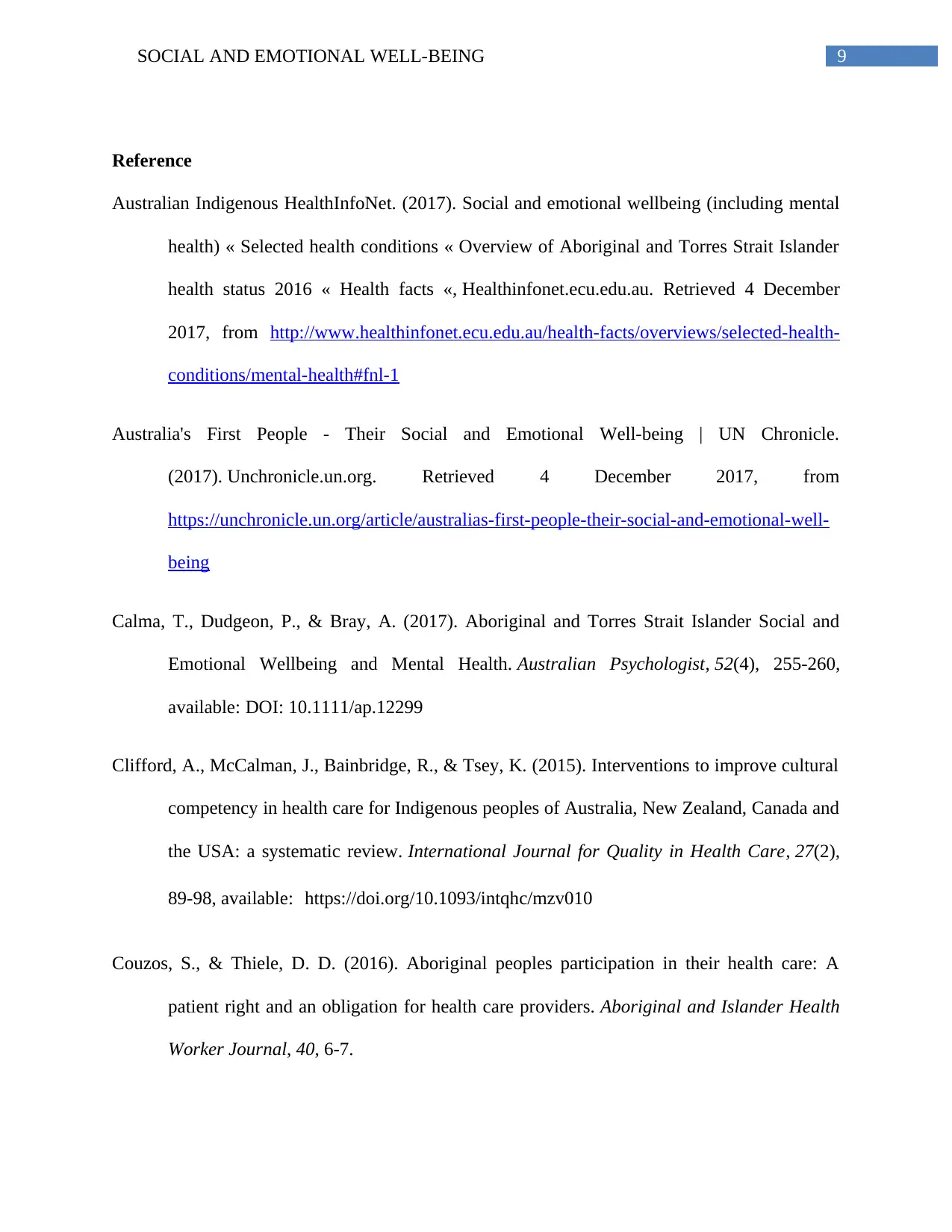
9SOCIAL AND EMOTIONAL WELL-BEING
Reference
Australian Indigenous HealthInfoNet. (2017). Social and emotional wellbeing (including mental
health) « Selected health conditions « Overview of Aboriginal and Torres Strait Islander
health status 2016 « Health facts «, Healthinfonet.ecu.edu.au. Retrieved 4 December
2017, from http://www.healthinfonet.ecu.edu.au/health-facts/overviews/selected-health-
conditions/mental-health#fnl-1
Australia's First People - Their Social and Emotional Well-being | UN Chronicle.
(2017). Unchronicle.un.org. Retrieved 4 December 2017, from
https://unchronicle.un.org/article/australias-first-people-their-social-and-emotional-well-
being
Calma, T., Dudgeon, P., & Bray, A. (2017). Aboriginal and Torres Strait Islander Social and
Emotional Wellbeing and Mental Health. Australian Psychologist, 52(4), 255-260,
available: DOI: 10.1111/ap.12299
Clifford, A., McCalman, J., Bainbridge, R., & Tsey, K. (2015). Interventions to improve cultural
competency in health care for Indigenous peoples of Australia, New Zealand, Canada and
the USA: a systematic review. International Journal for Quality in Health Care, 27(2),
89-98, available: https://doi.org/10.1093/intqhc/mzv010
Couzos, S., & Thiele, D. D. (2016). Aboriginal peoples participation in their health care: A
patient right and an obligation for health care providers. Aboriginal and Islander Health
Worker Journal, 40, 6-7.
Reference
Australian Indigenous HealthInfoNet. (2017). Social and emotional wellbeing (including mental
health) « Selected health conditions « Overview of Aboriginal and Torres Strait Islander
health status 2016 « Health facts «, Healthinfonet.ecu.edu.au. Retrieved 4 December
2017, from http://www.healthinfonet.ecu.edu.au/health-facts/overviews/selected-health-
conditions/mental-health#fnl-1
Australia's First People - Their Social and Emotional Well-being | UN Chronicle.
(2017). Unchronicle.un.org. Retrieved 4 December 2017, from
https://unchronicle.un.org/article/australias-first-people-their-social-and-emotional-well-
being
Calma, T., Dudgeon, P., & Bray, A. (2017). Aboriginal and Torres Strait Islander Social and
Emotional Wellbeing and Mental Health. Australian Psychologist, 52(4), 255-260,
available: DOI: 10.1111/ap.12299
Clifford, A., McCalman, J., Bainbridge, R., & Tsey, K. (2015). Interventions to improve cultural
competency in health care for Indigenous peoples of Australia, New Zealand, Canada and
the USA: a systematic review. International Journal for Quality in Health Care, 27(2),
89-98, available: https://doi.org/10.1093/intqhc/mzv010
Couzos, S., & Thiele, D. D. (2016). Aboriginal peoples participation in their health care: A
patient right and an obligation for health care providers. Aboriginal and Islander Health
Worker Journal, 40, 6-7.
Paraphrase This Document
Need a fresh take? Get an instant paraphrase of this document with our AI Paraphraser
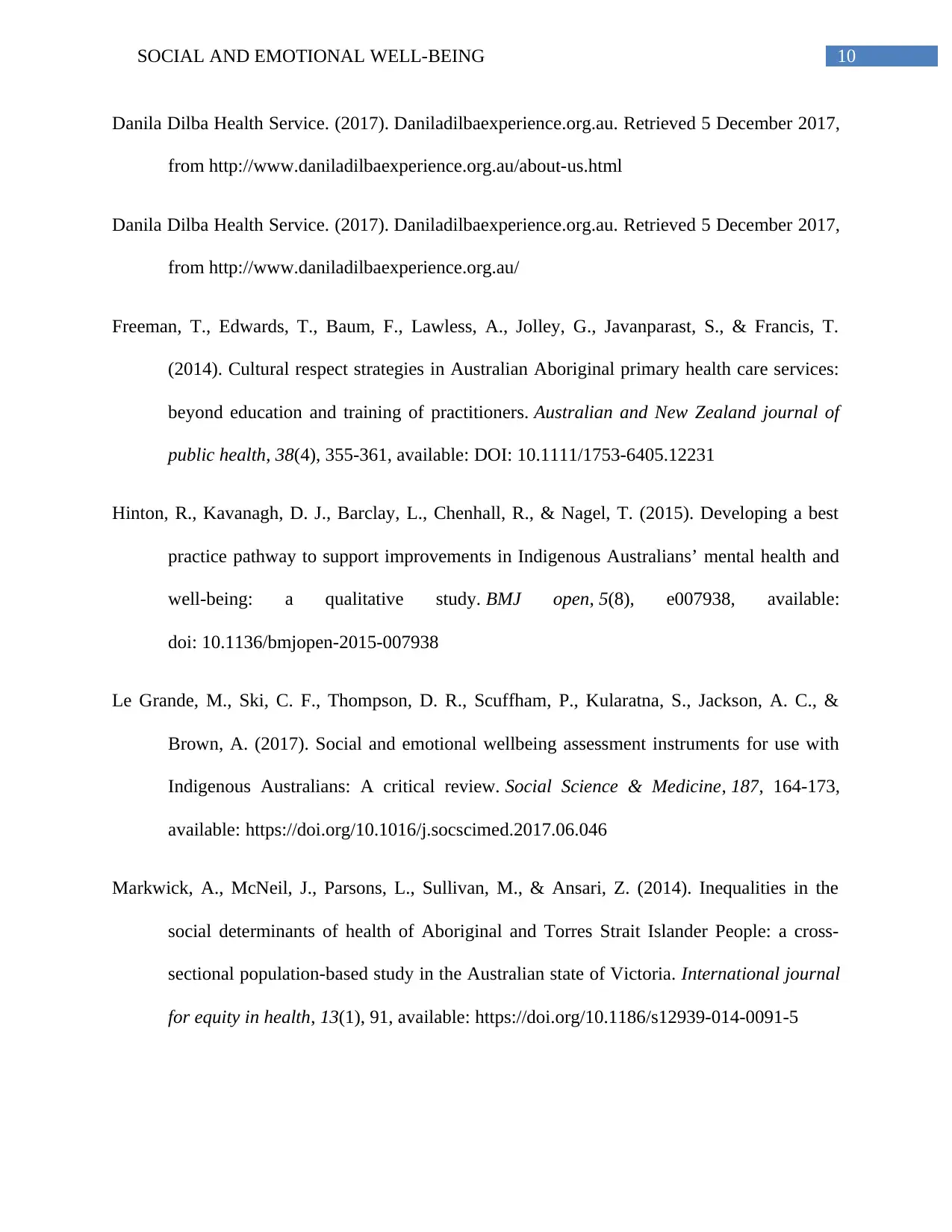
10SOCIAL AND EMOTIONAL WELL-BEING
Danila Dilba Health Service. (2017). Daniladilbaexperience.org.au. Retrieved 5 December 2017,
from http://www.daniladilbaexperience.org.au/about-us.html
Danila Dilba Health Service. (2017). Daniladilbaexperience.org.au. Retrieved 5 December 2017,
from http://www.daniladilbaexperience.org.au/
Freeman, T., Edwards, T., Baum, F., Lawless, A., Jolley, G., Javanparast, S., & Francis, T.
(2014). Cultural respect strategies in Australian Aboriginal primary health care services:
beyond education and training of practitioners. Australian and New Zealand journal of
public health, 38(4), 355-361, available: DOI: 10.1111/1753-6405.12231
Hinton, R., Kavanagh, D. J., Barclay, L., Chenhall, R., & Nagel, T. (2015). Developing a best
practice pathway to support improvements in Indigenous Australians’ mental health and
well-being: a qualitative study. BMJ open, 5(8), e007938, available:
doi: 10.1136/bmjopen-2015-007938
Le Grande, M., Ski, C. F., Thompson, D. R., Scuffham, P., Kularatna, S., Jackson, A. C., &
Brown, A. (2017). Social and emotional wellbeing assessment instruments for use with
Indigenous Australians: A critical review. Social Science & Medicine, 187, 164-173,
available: https://doi.org/10.1016/j.socscimed.2017.06.046
Markwick, A., McNeil, J., Parsons, L., Sullivan, M., & Ansari, Z. (2014). Inequalities in the
social determinants of health of Aboriginal and Torres Strait Islander People: a cross-
sectional population-based study in the Australian state of Victoria. International journal
for equity in health, 13(1), 91, available: https://doi.org/10.1186/s12939-014-0091-5
Danila Dilba Health Service. (2017). Daniladilbaexperience.org.au. Retrieved 5 December 2017,
from http://www.daniladilbaexperience.org.au/about-us.html
Danila Dilba Health Service. (2017). Daniladilbaexperience.org.au. Retrieved 5 December 2017,
from http://www.daniladilbaexperience.org.au/
Freeman, T., Edwards, T., Baum, F., Lawless, A., Jolley, G., Javanparast, S., & Francis, T.
(2014). Cultural respect strategies in Australian Aboriginal primary health care services:
beyond education and training of practitioners. Australian and New Zealand journal of
public health, 38(4), 355-361, available: DOI: 10.1111/1753-6405.12231
Hinton, R., Kavanagh, D. J., Barclay, L., Chenhall, R., & Nagel, T. (2015). Developing a best
practice pathway to support improvements in Indigenous Australians’ mental health and
well-being: a qualitative study. BMJ open, 5(8), e007938, available:
doi: 10.1136/bmjopen-2015-007938
Le Grande, M., Ski, C. F., Thompson, D. R., Scuffham, P., Kularatna, S., Jackson, A. C., &
Brown, A. (2017). Social and emotional wellbeing assessment instruments for use with
Indigenous Australians: A critical review. Social Science & Medicine, 187, 164-173,
available: https://doi.org/10.1016/j.socscimed.2017.06.046
Markwick, A., McNeil, J., Parsons, L., Sullivan, M., & Ansari, Z. (2014). Inequalities in the
social determinants of health of Aboriginal and Torres Strait Islander People: a cross-
sectional population-based study in the Australian state of Victoria. International journal
for equity in health, 13(1), 91, available: https://doi.org/10.1186/s12939-014-0091-5
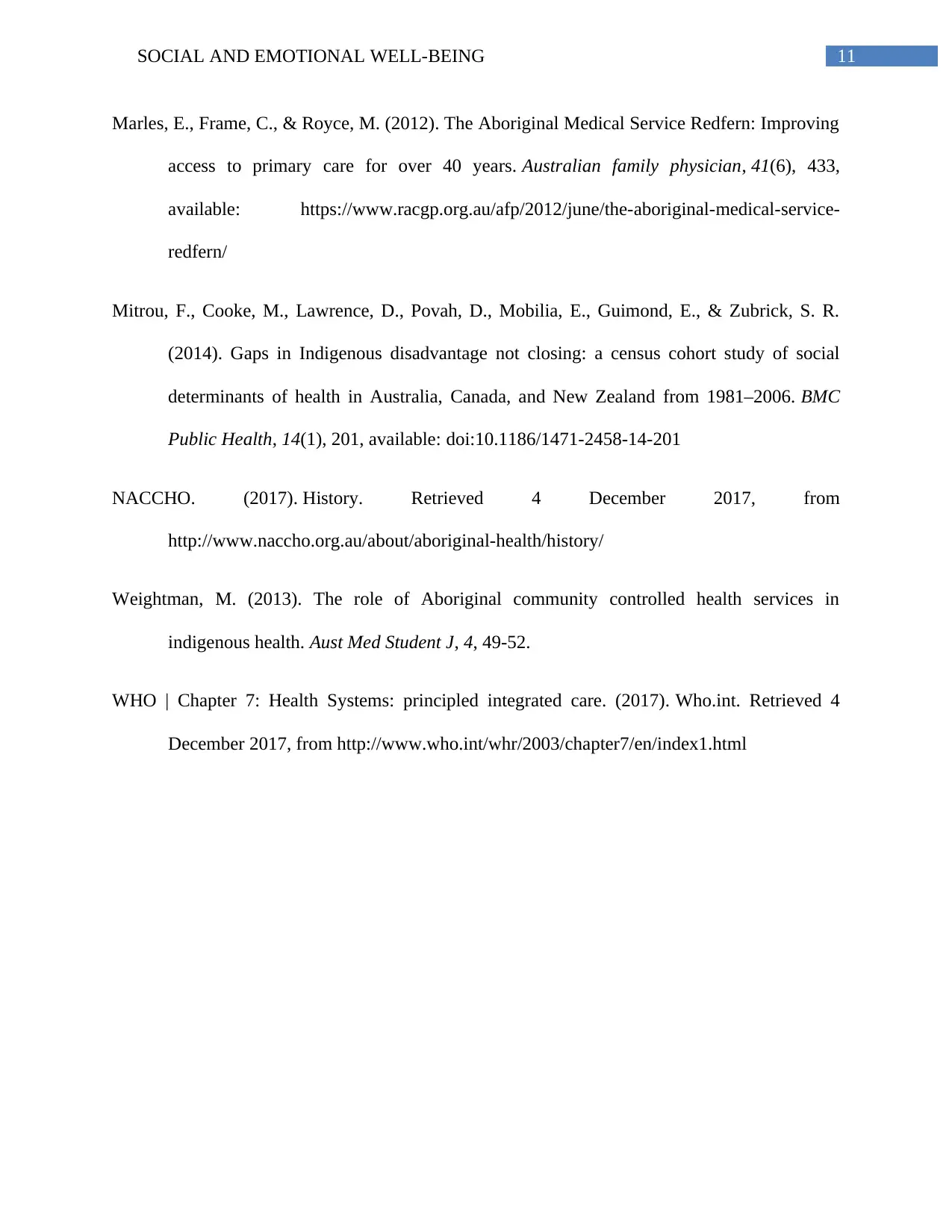
11SOCIAL AND EMOTIONAL WELL-BEING
Marles, E., Frame, C., & Royce, M. (2012). The Aboriginal Medical Service Redfern: Improving
access to primary care for over 40 years. Australian family physician, 41(6), 433,
available: https://www.racgp.org.au/afp/2012/june/the-aboriginal-medical-service-
redfern/
Mitrou, F., Cooke, M., Lawrence, D., Povah, D., Mobilia, E., Guimond, E., & Zubrick, S. R.
(2014). Gaps in Indigenous disadvantage not closing: a census cohort study of social
determinants of health in Australia, Canada, and New Zealand from 1981–2006. BMC
Public Health, 14(1), 201, available: doi:10.1186/1471-2458-14-201
NACCHO. (2017). History. Retrieved 4 December 2017, from
http://www.naccho.org.au/about/aboriginal-health/history/
Weightman, M. (2013). The role of Aboriginal community controlled health services in
indigenous health. Aust Med Student J, 4, 49-52.
WHO | Chapter 7: Health Systems: principled integrated care. (2017). Who.int. Retrieved 4
December 2017, from http://www.who.int/whr/2003/chapter7/en/index1.html
Marles, E., Frame, C., & Royce, M. (2012). The Aboriginal Medical Service Redfern: Improving
access to primary care for over 40 years. Australian family physician, 41(6), 433,
available: https://www.racgp.org.au/afp/2012/june/the-aboriginal-medical-service-
redfern/
Mitrou, F., Cooke, M., Lawrence, D., Povah, D., Mobilia, E., Guimond, E., & Zubrick, S. R.
(2014). Gaps in Indigenous disadvantage not closing: a census cohort study of social
determinants of health in Australia, Canada, and New Zealand from 1981–2006. BMC
Public Health, 14(1), 201, available: doi:10.1186/1471-2458-14-201
NACCHO. (2017). History. Retrieved 4 December 2017, from
http://www.naccho.org.au/about/aboriginal-health/history/
Weightman, M. (2013). The role of Aboriginal community controlled health services in
indigenous health. Aust Med Student J, 4, 49-52.
WHO | Chapter 7: Health Systems: principled integrated care. (2017). Who.int. Retrieved 4
December 2017, from http://www.who.int/whr/2003/chapter7/en/index1.html
⊘ This is a preview!⊘
Do you want full access?
Subscribe today to unlock all pages.

Trusted by 1+ million students worldwide
1 out of 12
Related Documents
Your All-in-One AI-Powered Toolkit for Academic Success.
+13062052269
info@desklib.com
Available 24*7 on WhatsApp / Email
![[object Object]](/_next/static/media/star-bottom.7253800d.svg)
Unlock your academic potential
Copyright © 2020–2026 A2Z Services. All Rights Reserved. Developed and managed by ZUCOL.





